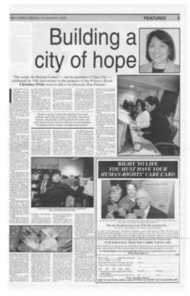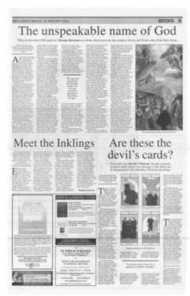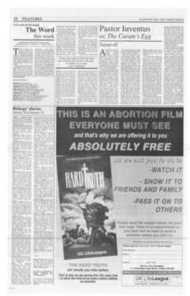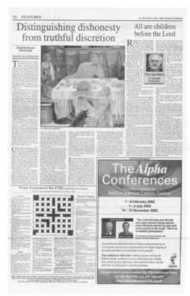Page 5, 18th January 2002
Page 5

Report an error
Noticed an error on this page?If you've noticed an error in this article please click here to report it.
Tags
Share
Related articles
Opus Del Accuses Bbc Of Whipping Up Prejudice
Opus De1 And Spain
Opus Dei: Church Within The Church
Opus Dei Comes In From The Cold – But Its Critics Are...
The'ordinary Catholics Of 134)u •
Opus Dei Spend $40m On Us Base
Building a city of hope,
This week, the Baytree Centre run by members of Opus Dei — celebrated its 10th anniversary in the presence of the Princess Royal.
Christina White went to talk to its Director, Mae Parrerio n the late 80s I lived in Stockwell, on the boundaries of Brixton.
Brixton then, as now, had Electric Avenue, the famous market and the Empire — but it was crumbling. The summer riots that had set the streets alight had marked the area with anarchy. Homes were derelict. There were pockets of regeneration but poverty defined the place I knew then. The English winter made it worse — the rain, the cold, edging the bleakness.
Twenty years on, poverty and racism remain, but there have been tangible, physical improvements. There's a new spirit to Brixton, a new heart in this once divided community, and at the centre a group of dedicated women who are rewriting the rules on racial harmony.
The Baytree Centre was inspired by the efforts of a Jesuit priest, Fr Hugh Thwaites, whose motivation was simply to do something positive. He begged premises off the council and established a soup kitchen offering catechism and the rosary for additional sustenance.
It was real and immediate help and word spread. He needed more volunteers, a system and hierarchy — he wanted people of commitment. He approached a priest of the Opus Dei charism for volunteers. "I need good Catholics. People who really know their catechism, who are committed to their faith," he said.
Today the Baytree Centre has 1,000 "beneficiaries" and occupies bright new premises on Brixton Road. It is a community-based charitable project for women and girls that has competed for and secured public funding. It is run by women — all members of Opus Dei, the lay Catholic organisation founded in 1928 by Blessed Josemaria Escriva de Balaguer. It is extraordinary because they have built from nothing and established a real and vital community resource.
Mae Parrefio has been the director since 1995. "They built this on a wing and a prayer," she says. "The good thing about our faith is that it is so blessed. You can grow anything anywhere. You rely on word of honour, you rely on generosity and a lot of sacrifice."
The Baytree centre may be run by workers of Opus Dei but the concerns are professional rather than apostolic.
The guiding principle is social inclusion for the disadvantaged. The centre offers courses in English literacy and in computer training — the creche facility enabling mothers to attend classes. It offers youth programmes and volunteer schemes. After school clubs and homework and study groups help to encourage young people to stay in education.
Sometimes it is simply about giving women confidence, showing them how to balance work and family; how to interact with other people. Baytree's message is undeniably appealing: from social inclusion, from living and acting as one family, comes racial harmony.
Mae Parreflo is petite and attractive with a light voice and a bright laugh. Born in the Philippines she has the grace of her country — she moves her hands elegantly and with expression. She is fiercely proud of the women who come here and of what they have achieved. She still remembers the feeling of being a stranger, she understands exclusion.
On Wednesday, HRH Princess Anne visited the Centre. Mae welcomed the visit as an opportunity to reach out to tradition, to royalty, quintessentially British: "The beneficiaries are multi-cultural and they haven't yet imbibed that sense of being British," she explains. "The integration is not deep."
I question the idea that cultural identity should be subsumed; what is her idea of cultural integration? "We have one God, one Father. Islamic, Christian believers and nonbelievers come here — there is oneness in that variety. We don't preach faith; we believe in the concept of the family."
She continues: "We treat people with dignity and we teach them, in turn, to have respect for others. I listen to my three-year-old the way I listen to my husband. I don't believe in hierarchy. In a family there is just love. It is simple, but it works."
Mae Parra() was a marine biologist by profession, work ing in university laboratories in the Philippines and the UK. She gave up her job when she had children: "For everything there is a season. I just wanted to give my attention to my marriage and to my children."
In the West we are governed by the diktats of capitalism. Money matters. Mae's father was murdered when she was five years old.
He witnessed a crime and was killed for giving evidence. A poor life became poorer. The family knew real hardship but it was financial poverty not spiritual.
She remembers as a child at Christmas having no money for the crib offering, so she sang instead, giving her voice. "I was trained by life to survive," she says. She can empathise with women alone. "We clung together my mother, my brother and I.
There was so much richness in our faith, the greatest gift we had was each other."
Mae Parreilo's faith was defined by that tragedy. As a small girl, on her way to school, she would go into the Catholic church and "talk" to the Blessed Sacrament. With her natural father dead she was drawn closer to her "father in heaven" — a way of reconciling sorrow. It underlines why, for her, "one family" is such a natural way of combating racial misunderstanding. She speaks of "divine filiation", of a sense of oneness with God. "I remember deep joy," she says. "My faith formed my character; it gave me foresight. It was my anchor." The introduction to Opus Dei came by chance through confession at St James's, Spanish Place in London. Her husband had preceded her into the confessional and came out smiling. "You'll like this priest," he said, "he's your sort of priest." There followed an intense period of spirituality which Mae describes as coming home. The priest belonged to Opus Dei.
"He explained that God was in the ordinary and the everyday. That I could be me and still live a life of vocation even when you are feeding your baby in the middle of the night, you are in the grace of God." It was the culmination of a life-long search for something extraordinary, what Mgr Escriva called "a walk towards holiness".
Opus Dei has its detractors. Escriva's rationale was the sanctification of ordinary work. He told his followers: "To be sensitive to human problems and to face them squarely, with a sense of responsibility, and resolve them in a Christian way." But that Christian resolve has brought accusations of rightwing extremism, of links to fascism and of flirtations with mortification, of mortal repentance. Does Opus Dei seek to divide and conquer?
Mae struggles to vocalise her sorrow at thismisconception". It is simply, she says, about living the gift given to us at baptism. Her only criticism, if it may be defined as such, is that an openness to God makes one vulnerable. She explains: "When I see anyone suffer, I see the suffering Christ, I am part of that body."
Today Opus Dei numbers some 80,000 members worldwide and in the summer Blessed Josemaria Escriva will be canonised. He has achieved his mission to bring the laity into the forefront of religious life. It is, as the retired Archbishop of Vienna, Cardinal Franz Konig, said recently, significant confirmation that Mgr Escriva "is neither alien nor marginal".
Mae Parrefto was not looking for saints. Many of Baytree's courses are accred ited and the women who attend go on to get jobs, to transform their lives.
But it is the little human victories that define this place. "Many of these women have been abandoned and yet society places no value on their motherhood. I tell these women you can't put a price on the unconditional love you have for your children. I tell them to stand tall by their commitments and they will feel tall."
The Baytree Centre is like many other places of community. What defines it is the spirituality of the people who have dedicated themselves to working here, whose efforts come genuinely from a sense of vocation.
The women they help are real women, often without hope, who are being given the opportunity to make something of their lives. It is breaking the mould.
Mae Parra() hopes that ethos will spread and that similar centres will be established across the country.
Baytree is a professional template that may be adapted to other cities and racial communities.
"I can share what energises me," she says. "It is the language of hope."
blog comments powered by Disqus













